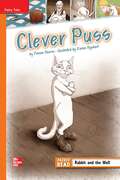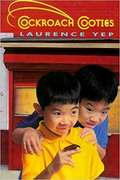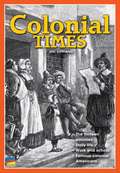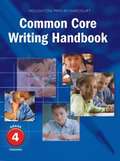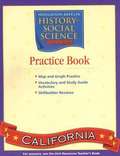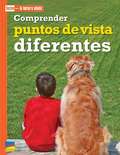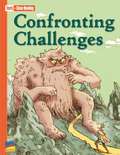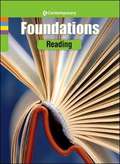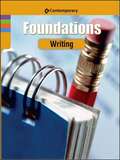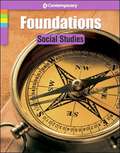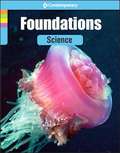- Table View
- List View
More NIMAC books are available at www.nimac.us. If you find your title in the NIMAC and not in Bookshare then please contact us to request it.
Coach New Generation Practice Tests, English Language Arts, [Grade] 4
by Triumph LearningNIMAC-sourced textbook
Coach New Generation Practice Tests, Mathematics, [Grade] 4
by Triumph LearningNIMAC-sourced textbook
Cockroach Cooties
by Laurence YepWhere there's a will, there's a way. If you want something badly enough, you will find the means to get it. Let demons, mages, technology and love show you the way. A collection of fantasy, science fiction and horror stories edited by Sasha Beattie. (More information on the stories is provided in the video. )
Coley's Journey (Fountas & Pinnell Classroom, Guided Reading)
by Jean KnoxNIMAC-sourced textbook. GPS Is for the Birds! Where do ospreys go when they migrate every year? Scientists wanted to find out, so they put a small backpack on an osprey. Inside the backpack was a tiny GPS device. Now ospreys are flying for science!
Colonial Times
by Jeri Cipriano Nancy WhiteFind out about what it was like to live, work, and play in colonial America and meet some of the influential people from that era.
Coming Clean (Fountas & Pinnell Classroom, Guided Reading)
by Pat McCann Jimmy HolderNIMAC-sourced textbook. Awesome Shirt. Bebe decides to take her sister's new shirt and wear it. No one will ever know. Or will they?
Common Core Writing Handbook, Grade 4
by Houghton Mifflin Harcourt Publishing Company StaffNIMAC-sourced textbook
A Community Cares and Shares (Into Reading, Level T #21)
by Diana NoonanNIMAC-sourced textbook. Who is in your community? A community is a group of people who live in the same area or have something in common. People in a community work together to make everyone feel safe and welcome!
Cómo se comunican los animales (¡Arriba la Lectura!, Level R #53)
by Annette SmithNIMAC-sourced textbook. ¿Sabías que los animales, al igual que los seres humanos, se comunican entre sí? Cuando los animales envían y reciben mensajes a través del olor, la vista, el sonido y el tacto, no solo se saludan: la comunicación es vital para su supervivencia.
Comprender puntos de vista diferentes: Textos Para La Lectura Atenta (Texts Close Reading Ser.)
by Benchmark Education Co. LLC StaffNIMAC-sourced textbook
Una comunidad cuida y comparte (¡Arriba la Lectura! Level P #21)
by Diana NoonanNIMAC-sourced textbook <p><p> ¿Quién forma parte de tu comunidad? Una comunidad es un grupo de personas que viven en la misma área o tienen algo en común. ¡Los miembros de una comunidad colaboran para que todos se sientan seguros y aceptados!
Contemporary Fiction: Writer's Journal (Amplify Core Knowledge Language Arts, Grade 4 #Unit 6)
by Amplify EducationNIMAC-sourced textbook
Contemporary Foundations: Reading
by McGraw-HillContemporary's Foundations series helps students improve their basic skills. Each book provides skill instruction, offers interesting passages to study, and furnishes opportunities for practice. Foundations provides meaningful contexts for learning, using language which is easy to understand. About Foundations: Reading, Revised Edition: Foundations: Reading will help students improve their reading ability, as well as their writing and thinking skills. Foundations: Reading is divided into four units: Practical Reading: ''survival'' reading that you do everyday. Practical reading includes instructions, advertisements, and explanations. Reading Nonfiction: writing based on facts. Nonfiction includes newspaper and magazine articles, books about real people and real events, and encyclopedia articles. Reading Poetry: verse that captures a person's feelings. Learning to recognize form, rhythm, rhyme, and images will help you read and appreciate poetry. Reading Short Fiction: stories created from an author's imagination. Characters, setting, plot, and theme are important elements in every story. These special features in Foundations: Reading will help students practice language skills: Writing Workshops: detailed instructions that will guide the student through the four-step writing process: prewriting, drafting, revising, and editing Language Tips: explanations, pronunciations, study hints, and background information that will help the student understand what he or she is reading Test Skills: a reminder that this skill is often tested on standardized tests Posttest: a test, evaluation chart, and answer key, to gauge the mastery of each skill. Revised Edition Features: New language tips, Updated content, including revised passages, updated graphs and images, More exercises. About the Series: In Foundations: Reading, students will read practical information, nonfiction, poetry, and short stories. They will learn to find the main point and the details; identify fact, opinion, and bias; make inferences; read photographs and cartoons; and understand rhythm, rhyme, plot, and theme. Writing Workshops, Language Tips, and prereading questions are designed to improve reading, writing, and thinking skills. In Foundations: Writing, students will practice the four steps to writing an essay: prewriting, drafting, revising, and editing. They will read and write five kinds of essays: descriptive essays, personal narratives, how-to essays, essays of example, and comparison-and-contrast essays. A language-skills workbook provides grammar, punctuation, and sentence structure practice. In Your Journal, With a Partner, and Language Tips will help students become better writers, and better readers and thinkers as well. In Foundations: Science, students will learn about the human body, plant biology, physics, chemistry, and Earth science. They will practice putting events in order; reading diagrams, charts, and graphs; using the scientific method; and making comparisons and contrasts. Try It yourself! activities will guide students through simple experiments so they will have a better understanding of what they have been reading about. Writing Workshops and Language Tips will help students use their reading and writing skills to think about science topics. In Foundations: Social Studies, students will learn about world history, U.S. history, civics and government, geography, and economics. They will summarize, make predictions, infer the main idea of cartoons, find information on maps, and read various kinds of graphs. Background Information, Language Tips, and Writing Workshops will let students use what they already know as they read and write about social studies topics. The revised edition includes a new World History chapter. In Foundations: Math, students will practice using whole numbers, money, decimals, fractions, ratios, and percents. Exercises will help students review the addition, subtraction, multiplication, and division facts; round numbers; estimate answers; and solve word problems. Math Notes, On their Calculator, and Language ...
Contemporary Foundations: Writing
by McGraw Hill Wright GroupContemporary'sFoundationsseries helps students improve their basic skills. Each book provides skill instruction, offers interesting passages to study, and furnishes opportunities for practice.Foundationsprovides meaningful contexts for learning, using language which is easy to understand. Foundations: Writingwill help students improve their writing skills, as well as their reading and thinking skills. Part I: Writing helps students practice the four stages of the writing process: Prewriting: planning and organizing Drafting: writing by following a plan Revising: evaluating and rewriting Editing: correcting grammar, mechanics, and usage Students will learn about five types of essays and practice writing each type: Descriptive Essay Personal Narrative How-To Essay Essay of Example Comparison-and-Contrast Essay Part II: Grammar focuses on language skills that writers need to understand. Grammar: nouns, pronouns, verbs, adjectives, and adverbs Punctuation: periods, question marks, exclamation marks, commas, and semicolons Sentence Structure: incomplete sentences, run-on sentences, and comma splices The following special features will help students practice their writing skills. In Your Journal: ideas to think about and write about on your own Language Tip: explanations, pronunciations, study hints, and background information that will help students understand what they read Test Skills: a reminder that this skill is often tested on standardized tests With a Partner: reading, writing, and thinking activities to do with a classmate, family member, or friend Posttest: a test, evaluation chart, and answer key to guage skill mastery Revised Edition Features: New language tips Updated content, including revised passages, updated graphs and images More exercises About the Series: In Foundations: Reading, students will read practical information, nonfiction, poetry, and short stories. They will learn to find the main point and the details; identify fact, opinion, and bias; make inferences; read photographs and cartoons; and understand rhythm, rhyme, plot, and theme. Writing Workshops, Language Tips, and prereading questions are designed to improve reading, writing, and thinking skills. In Foundations: Writing, students will practice the four steps to writing an essay: prewriting, drafting, revising, and editing. They will read and write five kinds of essays: descriptive essays, personal narratives, how-to essays, essays of example, and comparison-and-contrast essays. A language-skills workbook provides grammar, punctuation, and sentence structure practice. In Your Journal, With a Partner, and Language Tipswill help students become better writers, and better readers and thinkers as well. In Foundations: Science, students will learn about the human body, plant biology, physics, chemistry, and Earth science. They will practice putting events in order; reading diagrams, charts, and graphs; using the scientific method; and making comparisons and contrasts. Try It yourself!activities will guide students through simple experiments so they will have a better understanding of what they have been reading about. Writing Workshops and Language Tips will help students use their reading and writing skills to think about science topics. In Foundations: Social Studies, students will learn about world history, U.S. history, civics and government, geography, and economics. They will summarize, make predictions, infer the main idea of cartoons, find information on maps, and read various kinds of graphs. Background Information, Language Tips, and Writing Workshops will let students use what they already know as they read and write about social studies topics. The revised edition includes a new World History chapter. In Foundations: Math, students will practice using whole numbers, money, decimals, fractions, ratios, and percents. Exercises will help students review the addition, subtraction, multiplication, and division facts; round numbers; estimate answers; and solve word problems. Math Notes, On their Calculator, and Language Ti...
Contemporary Foundations: Social Studies
by Wright Group/McGraw-HillContemporary'sFoundationsseries helps students improve their basic skills. Each book provides skill instruction, offers interesting passages to study, and furnishes opportunities for practice.Foundationsprovides meaningful contexts for learning, using language which is easy to understand. AboutFoundations: Social Studies, Revised Edition : In Foundations: Social Studies, students will learn about world history, U.S. history, civics and government, geography, and economics. They will summarize, make predictions, infer the main idea of cartoons, find information on maps, and read various kinds of graphs. Background Information,Language Tips, andWriting Workshops will let students use what they already know as they read and write about social studies topics. The revised edition includes a new World History chapter. About the Series: In Foundations: Reading, students will read practical information, nonfiction, poetry, and short stories. They will learn to find the main point and the details; identify fact, opinion, and bias; make inferences; read photographs and cartoons; and understand rhythm, rhyme, plot, and theme. Writing Workshops, Language Tips, and prereading questions are designed to improve reading, writing, and thinking skills. In Foundations: Writing, students will practice the four steps to writing an essay: prewriting, drafting, revising, and editing. They will read and write five kinds of essays: descriptive essays, personal narratives, how-to essays, essays of example, and comparison-and-contrast essays. A language-skills workbook provides grammar, punctuation, and sentence structure practice. In Your Journal, With a Partner, and Language Tipswill help students become better writers, and better readers and thinkers as well. In Foundations: Science, students will learn about the human body, plant biology, physics, chemistry, and Earth science. They will practice putting events in order; reading diagrams, charts, and graphs; using the scientific method; and making comparisons and contrasts. Try It yourself!activities will guide students through simple experiments so they will have a better understanding of what they have been reading about. Writing Workshops and Language Tips will help students use their reading and writing skills to think about science topics. In Foundations: Social Studies, students will learn about world history, U.S. history, civics and government, geography, and economics. They will summarize, make predictions, infer the main idea of cartoons, find information on maps, and read various kinds of graphs. Background Information, Language Tips, and Writing Workshops will let students use what they already know as they read and write about social studies topics. The revised edition includes a new World History chapter. In Foundations: Math, students will practice using whole numbers, money, decimals, fractions, ratios, and percents. Exercises will help students review the addition, subtraction, multiplication, and division facts; round numbers; estimate answers; and solve word problems. Math Notes, On their Calculator, and Language Tips will help students improve math skills. The revised edition of Math is a major revision. The language has been updated to make the material even easier to follow than before. Foundations series at a glance
Contemporary Foundations: Science
by Wright Group/McGraw-HillContemporary's Foundations series helps students improve their basic skills. Each book provides skill instruction, offers interesting passages to study, and furnishes opportunities for practice.Foundations provides meaningful contexts for learning, using language which is easy to understand. About Foundations: Science, Revised Edition : In Foundations: Science, students will learn about the human body, plant biology, physics, chemistry, and Earth science. They will practice putting events in order; reading diagrams, charts, and graphs; using the scientific method; and making comparisons and contrasts. Try It yourself! activities will guide students through simple experiments so they will have a better understanding of what they have been reading about.Writing Workshops and Language Tips will help students use their reading and writing skills to think about science topics. About the Series: In Foundations: Reading, students will read practical information, nonfiction, poetry, and short stories. They will learn to find the main point and the details; identify fact, opinion, and bias; make inferences; read photographs and cartoons; and understand rhythm, rhyme, plot, and theme. Writing Workshops, Language Tips, and prereading questions are designed to improve reading, writing, and thinking skills. In Foundations: Writing, students will practice the four steps to writing an essay: prewriting, drafting, revising, and editing. They will read and write five kinds of essays: descriptive essays, personal narratives, how-to essays, essays of example, and comparison-and-contrast essays. A language-skills workbook provides grammar, punctuation, and sentence structure practice. In Your Journal, With a Partner, and Language Tips will help students become better writers, and better readers and thinkers as well. In Foundations: Science, students will learn about the human body, plant biology, physics, chemistry, and Earth science. They will practice putting events in order; reading diagrams, charts, and graphs; using the scientific method; and making comparisons and contrasts. Try It yourself! activities will guide students through simple experiments so they will have a better understanding of what they have been reading about. Writing Workshops and Language Tips will help students use their reading and writing skills to think about science topics. In Foundations: Social Studies, students will learn about world history, U.S. history, civics and government, geography, and economics. They will summarize, make predictions, infer the main idea of cartoons, find information on maps, and read various kinds of graphs. Background Information, Language Tips, and Writing Workshops will let students use what they already know as they read and write about social studies topics. The revised edition includes a new World History chapter. In Foundations: Math, students will practice using whole numbers, money, decimals, fractions, ratios, and percents. Exercises will help students review the addition, subtraction, multiplication, and division facts; round numbers; estimate answers; and solve word problems. Math Notes, On their Calculator, and Language Tips will help students improve math skills. The revised edition of Math is a major revision. The language has been updated to make the material even easier to follow than before.
